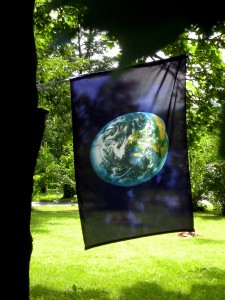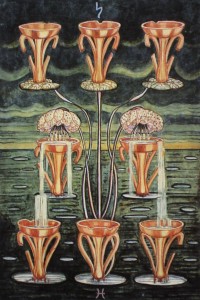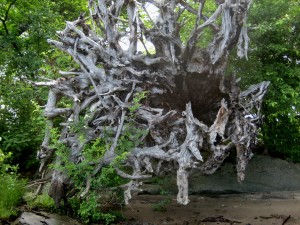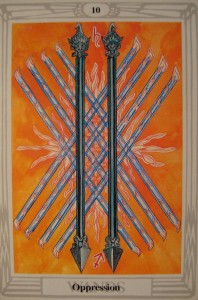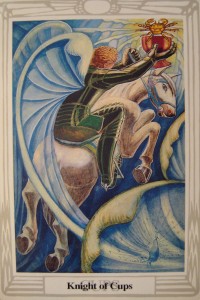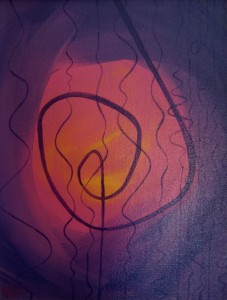
Notice the cords of attachment dragging down the energy, blocking what lies behind…
– Art by Jan Ketchel
Freedom is the ability to journey onward, no strings attached. Strings are projections of our energy that intertwine and attach to outside energy, whereby limiting a portion of our energetic essence’s independent movement. There is no negative judgment about attachment and commitment intended here, it’s simply a statement of energetic fact.
In an ultimate sense, freedom to not reincarnate requires the cutting of all energetic cords to attachments in this world. It’s the only way we can feely move beyond this world as a whole energetic being, releasing all outside attachments and retrieving our full energetic essence to journey freely.
Life in this world insists upon energetic attachment. The human playing field requires energetic attachment outside the self for survival and fulfillment. Refusal to attach while in human form is its own seed of reincarnation. We must have fulfillment in attachment in this world to be freed of our need for that human attachment, the prerequisite to end reincarnation.
The challenge throughout life is to take conscious responsibility, to keep inventory on our energetic attachments. Decisions must be made about the efficiency and value of our energetic investments.
We must examine the contents of our attics and cupboards, where we store our projected energy in the densest and heaviest form—in objects. As we sift through our accumulation of things, we must ask ourselves, why am I holding onto this? Do I ever use it? Do I ever look at it? Do I need it? Where did it come from? What outside energy is attached to it? What would it mean for me to get rid of it?
As we take the journey with these questions we are led into recapitulation. We experience the energetic history intertwined with our own energy, once projected into these dense objects. If indeed the object has no value to our current journey, it may be time to shed the weight of this attachment and free our energy that remains bound to it as long as it remains in our possession, hidden in the attic or otherwise. It’s not enough to simply find a new safe home for an object either. We must release our energy from it, truly let it go if we are to recapture our energy from it.

– Photo by Jan Ketchel
If we give away an object that we are still attached to we are merely transferring the care of our energy to another caretaker. To release an object fully is to have no attachment to the fate of its outcome once we send it off. We will know that we have truly recapitulated when we can honestly walk away in lightness, granting the object full freedom to take its own continuing journey.
In more subtle form, we must take inventory of our digital energetic commitments too. It is rare that I see a dog being walked or a car being driven where eyes are not cast intermittently downward at incoming digital information. Facebook has become the largest human marketplace, or mall, where energetic strings of attention are deeply embedded.
Where is the freedom to move about fully in this world for 5 minutes unencumbered by the ping of the prison walls of an incoming text or posting that demands immediate attention and energetic commitment? How are we ever to discover and develop to the fullest potential our own energetic capacities of telepathy, clairvoyance, intuition, out-of-body exploration if our energy is completely captivated by digital dependence and servitude? Where is the freedom in such technological advancement if it binds the lion’s share of our energetic attention?
If our intent is energetic freedom, we must be frugal in our energetic attachments. If an object or energetic device binds our energy and evokes fear in us at the thought of letting go or being without, we must face the true condition of our servitude and release any illusion of freedom that the device purports to deliver.
Finally, in the area of relationship, we must be ruthlessly honest with ourselves as we inventory our commitments. Are those we journey with truly traveling companions, also energetically intent upon freedom? Are we holding onto sentimental relics or obligations that bind our energy and refuse to allow us to change and evolve? Have we met our archetypal obligations as parents and caretakers? Do we bind our energy to past roles that no longer really exist, and in so doing hinder the resumption of our own journeys to freedom? Do we need to challenge ourselves to go into the world and experience deep emotional commitment, a requirement to fulfillment? Only if we face these energetic facts squarely can we plot our energetic course to fulfillment and ultimate freedom.
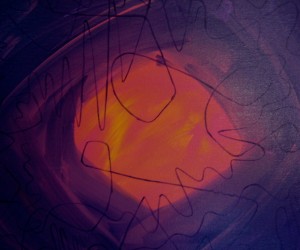
– Art by Jan Ketchel
As we journey through this life we must attach. Recapitulation allows us to disentangle our energy from attachments that have completed their course and now require deep release for completion. Having our vital energy recouped in recapitulation, we can then apply it toward fulfillment of our potential and, when the time is right, for releasing all the strings as we journey deeper into the unfolding mystery, fully energetically present for what comes next!
Releasing strings,
Chuck

